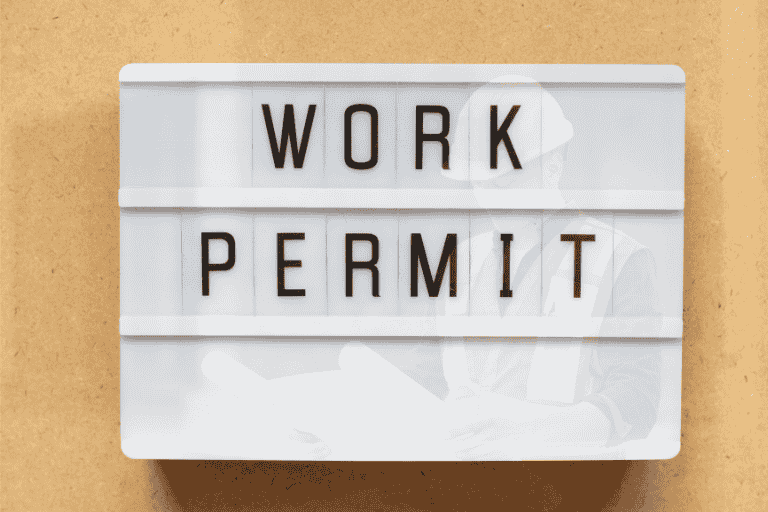How to Apply for a UK Work Permit in 7 Easy Steps

A UK work permit is essential for most foreign nationals seeking employment in the country. It serves as legal authorization to work and ensures compliance with immigration laws. “How to Apply for a UK Work Permit”
Work permits are required for individuals who do not hold British or Irish citizenship or have indefinite leave to remain in the UK. However, certain individuals, such as EU nationals with settled status under the EU Settlement Scheme, are exempt. Correctly applying for a work permit is crucial to avoid delays, rejections, or legal issues that can jeopardize your employment plans.
Eligibility Criteria
Who Can Apply for a UK Work Permit?
The UK work permit system is points-based, meaning applicants must meet specific criteria to qualify. This typically includes factors like job role, salary threshold, and English language proficiency.
Categories of UK Work Permits
- Skilled Worker Visa: For individuals with a job offer from a UK-based sponsor in a qualifying role, such as healthcare, IT, or engineering.
- Seasonal Worker Visa: Temporary permits for roles in industries like agriculture or horticulture.
- Global Talent Visa: For highly skilled individuals in fields like science, arts, and technology.
- Temporary Worker Visas (Tier 5): For short-term employment, such as charity work or internships.
Each category has unique eligibility requirements, often tied to the specific job and industry.
Step-by-Step Application Process
Step 1: Check Eligibility and Gather Documents
Begin by confirming you meet the criteria for your chosen visa category. This may include:
- Proof of qualifications and work experience.
- A valid job offer from a licensed UK sponsor.
- English language test results (if required).
Step 2: Find a UK-Based Sponsor/Employer
To apply for most work visas, you need a sponsor. Employers must hold a sponsorship license to hire foreign workers. You can find jobs through recruitment agencies, job boards, or company websites.
Step 3: Complete the Online Application Form
Applications are submitted via the UK government’s official website (gov.uk). Follow the prompts to fill out the required details, upload documents, and verify your information.
Step 4: Pay the Application Fees
Fees vary based on the visa type and duration. Expect to pay:
- Visa application fees (starting from £610 for a Skilled Worker visa).
- Immigration Health Surcharge (IHS) at £624 per year. Payment must be made online during the application process.
Step 5: Attend Biometric Appointments
After submitting your application, you’ll be invited to a visa center to provide biometric data—fingerprints and a photograph. This is required to issue your biometric residence permit.
Tips for a Successful Application
- Avoid Common Mistakes: Double-check details like your name, passport number, and job code to prevent errors.
- Prepare Strong Supporting Documents: Ensure all documents are up-to-date and certified where necessary.
- Seek Professional Assistance: Legal professionals or recruitment agencies can guide you through the process, especially for complex applications.
Types of UK Work Permits and Visas
Understanding the various visa options is key to choosing the right one. Here’s a comparison:
- Skilled Worker Visa: Best for long-term employment in skilled professions. Renewable and leads to settlement.
- Temporary Worker Visa (Tier 5): Ideal for short-term roles like internships or cultural exchange programs.
- Global Talent Visa: Offers flexibility for highly skilled professionals without needing a job offer.
- Seasonal Worker Visa: Designed for temporary roles in agriculture.
Each visa type varies in its validity period, renewal process, and path to permanent residency.
Document Checklist
Ensure you have the following documents ready for your application:
- Passport or travel document.
- Job offer letter from a licensed UK employer.
- Certificate of Sponsorship (CoS) from your sponsor.
- Proof of English language proficiency.
- Proof of qualifications and experience.
- Certified translations for non-English documents.
Organizing these documents before applying will streamline the process and reduce delays.
Application Fees and Costs
Applying for a UK work permit involves several costs:
- Visa Application Fees: From £610 to over £1,400 depending on the visa type.
- Immigration Health Surcharge (IHS): £624 annually.
- Biometric Data Fee: Included in most visa applications.
- Additional Costs: Certified translations, legal assistance, or expedited services may incur extra charges.
Budgeting for these fees will help avoid financial surprises.
Processing Time and What to Expect
Visa processing times vary based on the type of application and volume of requests. For example:
- Skilled Worker Visa: Usually processed within 3 weeks for standard applications.
- Global Talent Visa: May take up to 8 weeks.
After submission, you can track your application status online. Once approved, your biometric residence permit will be mailed to your UK address.
What to Do if Your Application Is Rejected
Rejections can happen for several reasons:
- Incorrect or missing documents.
- Failure to meet eligibility criteria.
- Errors in the application form.
If your application is denied, you can:
- Request a review of the decision.
- File an appeal if eligible.
- Reapply after addressing the issues cited in the rejection.
Working with immigration advisors can increase your chances of success in these situations.
FAQs About UK Work Permits
Can dependents be included in the application?
Yes, your spouse and children can apply as dependents under most visa types. Additional fees apply.
Is it possible to switch visas after arriving in the UK?
Switching visas is allowed in some cases, such as moving from a student visa to a Skilled Worker visa.
Are there restrictions for specific industries?
Certain jobs, like healthcare or education, require additional checks such as a criminal record certificate.
By following this guide, you’ll be well-equipped to navigate the UK work permit process with confidence. Whether you’re a skilled professional, a seasonal worker, or a student transitioning to employment, understanding the requirements and preparing thoroughly will help you achieve your goal of working in the UK.



